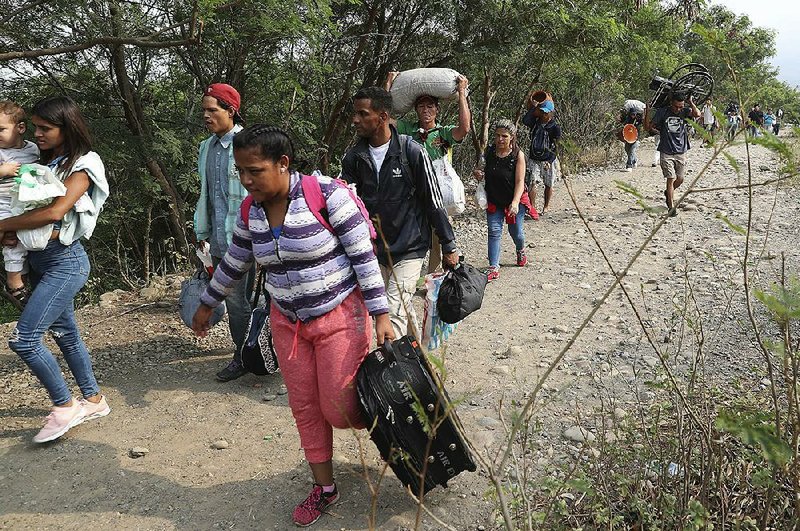CARACAS, Venezuela -- Venezuelan opposition leader Juan Guaido has called for nationwide demonstrations today to coincide with his planned return to the country, in the latest challenge against President Nicolas Maduro.
Guaido on Sunday tweeted that Venezuelans should monitor his official announcements and that he would provide details about meeting points for supporters. He said Venezuelans should gather across the country at 11 a.m. local time.
Guaido -- the 35-year-old leader of the National Assembly who declared himself president in late January -- also tweeted a photo of himself walking across an airfield ahead of his departure from the naval base in Salinas, Ecuador, where he met Ecuadorean President Lenin Moreno on Saturday. Guaido said he was "taking off," but he did not say where the plane was heading.
Guaido slipped from Venezuela into neighboring Colombia on Feb. 22 for what opposition leaders had billed as a potential turning point in Venezuela's political crisis -- a showdown with security forces on the border over the passage of tons of international humanitarian assistance. But the security forces largely stayed loyal to Maduro and dispersed protesters with tear gas and rubber bullets, leaving truckloads of aid stranded outside a country in desperate economic straits.
The opposition leader then embarked on a tour of Latin American countries designed to increase pressure on Maduro to resign.
Maduro's government has not made any official comment about its adversary's announced return to Venezuela. Maduro previously said Guaido will "face justice" if he returns, noting that Guaido defied a Venezuelan court order barring him from leaving the South American country.
In Venezuela, anticipation grew ahead of Guaido's expected arrival. Opposition activists circulated a call on social media for people to gather this morning at the Alfredo Sadel plaza in Las Mercedes, a shopping and entertainment area in Caracas where protests have been held in the past.
But others in Caracas said that today was a poor choice for a protest because some people have already left the city. The government has urged Venezuelans to celebrate the carnival season today and Tuesday by traveling to beaches and other holiday spots.
Guaido wants Maduro to quit, saying Venezuela can then emerge from its political and humanitarian crisis with international support. Maduro says Guaido is part of a U.S.-backed plot to overthrow his government and that the failed attempt by the opposition to get aid into Venezuela from Brazil and Colombia was a political stunt.
The United States and about 50 other countries recognize Guaido as Venezuela's president, arguing that Maduro's re-election last year was a sham.
EU foreign policy chief Federica Mogherini has warned the Venezuelan government not to take any action against Guaido.
"In this respect any measure that could put at risk Juan Guaido's freedom, safety or personal integrity would represent a major escalation of tensions and meet the firm condemnation of the international community," Mogherini said.
Guaido has become the biggest threat to Maduro since the former union leader succeeded Hugo Chavez in 2013 as the head of a radical leftist government. Tens of thousands of people have responded to Guaido's calls for anti-government demonstrations in recent weeks.
Margarita Lopez Maya, a Venezuelan political scientist, predicted that Maduro would not be dissuaded by threats of censure by foreign nations.
"I think Maduro has shown he's ready to assume the political costs of appearing a monster in the international community," she said.
On Sunday, John Bolton, the U.S. national security adviser, said that if Maduro detains the opposition leader, "it would just hasten the day that he leaves."
President Donald Trump has said that the United States was maintaining "all options" to deal with the Venezuela crisis -- even military action, though his aides have downplayed that possibility. Bolton, speaking in an interview with Fox News Sunday, said the U.S. wants "a peaceful transition of power."
Maduro has grown increasingly unpopular as Venezuela's oil-based economy has collapsed because of government mismanagement and lower petroleum prices in recent years. The International Monetary Fund has warned that inflation could hit 10 million percent this year. Food and medicine have become scarce.
Jazmin Fernandez, 47, a chemical engineer who was walking her three dogs in Caracas on Sunday, said she was ready to join the protests Guaido had called for today and Tuesday.
"I'm not scared. I have already been hit in many marches," she said. "In fact, I had a confrontation with a National Guard officer, and I bit her so hard that she let me go. I am desperate. I want Maduro out."
But Maribel Urbina, 50, a cashier at a stand producing arepas -- Venezuelan cornmeal cakes -- said she had become fearful after being tear-gassed during protests in 2017.
"I'm not going" to the demonstration, she said. "I'm a coward."
Information for this article was contributed by Christopher Torchia of The Associated Press and by Mary Beth Sheridan and Mariana Zuniga of The Washington Post.
A Section on 03/04/2019
